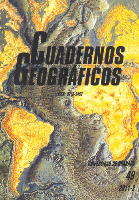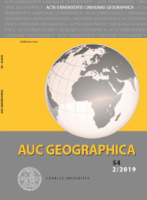
CyberGeo-European Journal of Geography
Scope & Guideline
Innovating Geography: Research Without Borders
Introduction
Aims and Scopes
- Urban Geography and Planning:
The journal emphasizes research on urban environments, examining spatial dynamics, urban planning methodologies, and the socio-political implications of urban design and governance. - Environmental Geography and Climate Change:
A significant focus is placed on the impact of climate change on geographical landscapes, including studies on agricultural practices, urban climate adaptation, and environmental resilience. - Socio-Spatial Analysis:
CyberGeo publishes works that explore social dynamics and spatial representations, particularly concerning marginalized communities, social vulnerability, and public health. - Technological Integration in Geography:
The journal discusses the role of digital technologies in geography, including data collection, visualization techniques, and their implications for urban planning and emergency management. - Historical and Cultural Geography:
Research on the historical contexts of geographical spaces, cultural landscapes, and the evolution of urban areas is also a core component, providing insights into the socio-cultural dimensions of geography.
Trending and Emerging
- Impact of Digital Technologies on Geography:
There is an increasing emphasis on how digital tools and technologies shape geographical research and urban planning, particularly in the context of data management, visualization, and public engagement. - Urban Climate Adaptation Strategies:
Research focusing on urban adaptation to climate change is emerging as a critical theme, highlighting the need for cities to develop resilience strategies in response to environmental challenges. - Public Health and Geography:
The intersection of public health and geography is becoming more prominent, with studies examining how spatial factors influence health outcomes and the management of health crises, such as those highlighted during the COVID-19 pandemic. - Social Vulnerability and Risk Management:
Emerging studies analyze social vulnerability in urban contexts, particularly concerning disaster risk management and the implications of socio-spatial inequalities. - Transnational and Comparative Studies:
There is a growing trend towards comparative studies that examine geographical phenomena across different regions, reflecting a more globalized view of geography and its challenges.
Declining or Waning
- Rural Geography and Development:
While rural studies were once a prominent theme, recent publications indicate a shift towards urban-centric issues, reflecting changing research interests and possibly diminishing attention to rural dynamics. - Historical Geography:
Research specifically focused on historical geography seems to be declining, as contemporary themes in urban and environmental geography take precedence over historical analyses. - Traditional Land Use Studies:
There appears to be a waning interest in traditional land use studies, with fewer papers addressing this topic compared to emerging themes related to urban adaptation and climate resilience.
Similar Journals

Journal of Geography-Cografya Dergisi
Shaping Tomorrow's Geography TodayJournal of Geography-Cografya Dergisi, with ISSN 1302-7212 and E-ISSN 1305-2128, is an esteemed publication in the field of geography, dedicated to advancing scholarly research and knowledge in this vital discipline. Published by the Faculté des Lettres, Department of Geography at Istanbul University, this journal has embraced an Open Access policy since 2017, ensuring that cutting-edge research is freely accessible to a global audience, thereby fostering interdisciplinary collaboration and widening the dissemination of geographical studies. The journal aims to publish high-quality research articles, reviews, and case studies that address contemporary geographical challenges, methods, and innovations, appealing to researchers, professionals, and students alike. With its strategic location in Istanbul, a city that exemplifies a rich tapestry of geographical phenomena, the journal holds a vital role in connecting scholars with the diverse landscapes and cultural experiences that shape our understanding of geography. Join the vibrant community of geography enthusiasts and contribute to the ongoing dialogue within this dynamic field.

GEOGRAFICKY CASOPIS-Geographical Journal
Charting new territories in geography and earth sciences.GEOGRAFICKY CASOPIS-Geographical Journal is a prestigious publication dedicated to advancing knowledge in the fields of geography and earth sciences, published by the SLOVAK ACADEMY OF SCIENCES, INSTITUTE OF GEOGRAPHY. With a rich history dating back to its inception in 1976, the journal serves as a vital forum for researchers and professionals to disseminate their findings across a range of topics including earth-surface processes, geography, planning, development, and geology. Notably, it maintains a respectable Q3 category ranking across these disciplines as of 2023, indicating its contribution to relevant academic discourse. The journal is indexed under critical databases and engages a global audience, making it an essential resource for scholars seeking to stay informed about contemporary issues and advancements in geography. Although currently not an open-access journal, it emphasizes the sharing of significant research findings and encourages submissions from various geographical contexts to enrich the scientific community. Geographical Journal's commitment to fostering interdisciplinary dialogue ensures its relevance and importance in shaping the future of geographical research.

TIJDSCHRIFT VOOR ECONOMISCHE EN SOCIALE GEOGRAFIE
Shaping Academic Discourse in Economics and GeographyTIJDSCHRIFT VOOR ECONOMISCHE EN SOCIALE GEOGRAFIE, an esteemed journal published by WILEY, provides a premier platform for the dissemination of cutting-edge research within the fields of economics and social geography. With an ISSN of 0040-747X and an E-ISSN of 1467-9663, this journal has established itself as a pivotal resource, exhibiting a remarkable Q1 ranking in both Economics and Econometrics as well as Geography, Planning and Development for 2023. Notably, it is positioned in the 95th percentile among 821 journals in its category of Social Sciences, and ranks 46th among 716 in Economics and Econometrics, underscoring its influential role in shaping academic discourse. The journal, which has been in publication since 1967 and is anticipated to run through 2024, invites contributions that explore the intricate interplay between economic phenomena and social geospatial dynamics. Researchers, professionals, and students are encouraged to engage with its findings, which are crucial for understanding contemporary socio-economic challenges and innovations on a global scale.

Cuadernos Geograficos
Fostering collaboration for a deeper understanding of geography.Cuadernos Geograficos is a distinguished open access journal published by UNIV GRANADA in Spain, dedicated to advancing the fields of geography, planning, and earth-surface processes. With an ISSN of 0210-5462 and E-ISSN 2340-0129, this journal has been serving as an essential platform for scholars since its inception in 1983. By providing rigorous peer-reviewed research, Cuadernos Geograficos contributes significantly to the academic discourse within these disciplines, holding a respectable position in the Q3 category for both Earth-Surface Processes and Geography, Planning, and Development as of 2023. The journal is indexed in Scopus, ranking #431/821 in Social Sciences and #100/179 in Earth and Planetary Sciences, affirming its relevance and impact within the scholarly community. With its commitment to open access since 1999, Cuadernos Geograficos ensures that vital research is accessible to a diverse audience of researchers, professionals, and students, fostering knowledge sharing and collaborative advancements in the geographical sciences.

Urban Science
Exploring the Complexities of Urban LivingUrban Science, published by MDPI in Switzerland, is a pioneering open access journal that has been serving the academic community since 2017. With a robust focus on understanding urban environments through various interdisciplinary lenses such as Environmental Science, Geography, Planning and Development, and Urban Studies, this journal aims to advance knowledge on the complexities of urban living and the challenges that modern cities face. Recognized for its impact, Urban Science holds prestigious rankings, including Q1 in Urban Studies and Q2 in multiple relevant categories. Its presence in leading databases like Scopus, where it stands among the top percentile ranks, underscores its contribution to critical dialogues in urban research. The journal’s commitment to accessibility, targeted toward researchers, professionals, and students alike, fosters an inclusive platform for disseminating innovative ideas and solutions necessary for sustainable urban development.

Geografie
Connecting diverse perspectives in geography and development.Geografie, published by the Czech Geographic Society, serves as a vital resource in the fields of geography, planning, and development. With an E-ISSN of 1212-0014, this esteemed journal has been contributing to the academic landscape since its inception in 1992, providing a platform for rigorous research and diverse perspectives on earth-surface processes and regional development issues. Based in the heart of Prague at Charles University, it has reached an impressive convergence of scholarly excellence, ranking in the Q3 category for both Earth-Surface Processes and Geography, Planning and Development as of 2023. Although it does not currently offer open access, the journal is indexed in Scopus, holding significant positions within its realms—392nd out of 821 in Social Sciences and 89th out of 179 in Earth and Planetary Sciences—indicating its relevance and contribution to ongoing discussions in both disciplines. As an indispensable tool for researchers, professionals, and students alike, Geografie not only enhances the understanding of spatial processes but also fosters innovative solutions for contemporary geographical challenges.

Geographia Polonica
Fostering Scholarly Dialogue Across Geographical FrontiersGeographia Polonica is a premier academic journal published by the Polish Academy of Sciences, Institute of Geography and Spatial Organization, renowned for its contributions to the field of geography and related disciplines. With a history spanning from 1972, it has evolved into a vital resource for researchers and professionals, addressing a wide spectrum of topics from cultural studies to urban planning and development. Geographia Polonica is indexed with impressive rankings in various categories, including a Q1 classification in Cultural Studies and significant positions in Earth and Planetary Sciences and Urban Studies, reflecting its influence and recognition in these critical areas. Although it operates under a traditional subscription model, its commitment to high-quality, peer-reviewed research ensures that the latest findings and advancements are accessible to the academic community. With its rich archival content and contemporary insights, Geographia Polonica serves as an essential platform for scholarly dialogue, making it an invaluable reference for students, researchers, and professionals eager to explore the complexities of spatial organization and geographical phenomena in a global context.

AUC Geographica
Connecting Scholars in the Realm of Earth SciencesWelcome to AUC Geographica, a distinguished journal published by CHARLES UNIV PRAGUE, KAROLINUM PRESS, focusing on the expansive and interdisciplinary fields of Earth and Planetary Sciences, as well as Geography, Planning, and Development. With an ISSN of 0300-5402 and an E-ISSN of 2336-1980, this Open Access journal has been freely accessible since 2010, allowing researchers, professionals, and students to engage with high-quality scholarly articles without barriers. As of 2023, it holds a Q4 ranking in its respective categories, reflecting its commitment to contributing to the academic discourse despite competitive landscapes. Located in Prague, Czech Republic, at OVOCNY TRH 3/5, PRAGUE 1 116 36, AUC Geographica aims to foster collaboration and innovative research in the multifaceted relationships between human activities and the natural environment. With a publication history spanning from 1975 to 2024, this journal continues to be a vital resource for those seeking to advance knowledge and explore new dimensions in geography and Earth sciences.

Geographica Pannonica
Advancing Knowledge in Geography and Atmospheric SciencesGeographica Pannonica is a premier, open-access journal dedicated to the various dimensions of geography, atmospheric sciences, geology, and related fields. Published by the University of Novi Sad's Faculty of Natural Sciences and Mathematics, this Serbian journal has been a vital platform for scholarly discourse since its inception, with an open-access policy established in 2010 to enhance the dissemination of research findings. Covering a spectrum of topics from Earth-surface processes to tourism management, the journal has achieved notable rankings, reflecting its commitment to impactful research—ranking in the Q3 quartile across multiple categories in 2023. Researchers, professionals, and students are encouraged to engage with the latest articles that contribute to advancing our understanding of geographical phenomena and sustainability challenges, making Geographica Pannonica an essential resource for the global academic community.

Annals of the American Association of Geographers
Navigating the Intersections of Geography and SocietyAnnals of the American Association of Geographers is a leading academic journal published by Routledge Journals, Taylor & Francis Ltd, and is based in the United Kingdom. With an impact factor positioning it in the Q1 category for both Earth-Surface Processes and Geography, Planning and Development, it stands as a pivotal resource for researchers and professionals in the fields of geography and environmental sciences. The journal’s broad scope accommodates a diverse range of topics, including spatial analysis, environmental change, and human geography, reflecting the dynamic nature of geographical research. Accessible in both print and digital formats, the journal encourages open dialogue and dissemination of knowledge among its authors, readers, and the academic community. As it converges through the years from 2016 to 2024, the Annals continues to showcase high-quality research that influences geographic thought and practice, making it essential reading for students, academics, and practitioners alike.